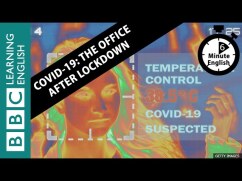PeopleWhoCanTasteWords.pdf
PeopleWhoCanTasteWords.mp3
Neil
Hello. This is 6 Minute English from BBC Learning English. I’m Neil.
Sam
And I’m Sam. Many people have favourites – a favourite colour, a favourite flavour,
a favourite word. What’s yours, Neil?
Neil
Hmm, my favourite colour is green, my favourite flavour is sweet-and-sour, and,
well, I don’t know if it’s my favourite, but there is a word I really like saying out
loud – ‘nincompoop’. It means a silly person.
Sam
For me, it’s the taste of coffee, and the smell of lavender, or freshly baked bread.
Neil
Our favourite tastes, smells and colours are controlled by our five senses – sight,
sound, smell, taste, and touch. For most of us they don’t mix. We see colours and
taste flavours, but we can’t taste sounds.
Sam
But that’s not how everyone’s brain works. Imagine being able to ‘taste’ every word
that you hear. In this programme, we’ll meet two sisters from Glasgow in Scotland
who can do just that. And as usual, we’ll learn some new vocabulary as well.
Neil
Julie McDowall and her younger sister, Jen McCready, have synaesthesia, a
neurological condition where two or more senses mix together. When synesthetes,
as they’re called, hear a word, their sense of taste also becomes activated. Words
produce specific tastes on their tongues. For example, when Jen hears the name
of her daughter, Sophia, she tastes pink marshmallows! And the name ‘Leo’ tastes
like noodles.
Sam
We’ll hear more from the unusual sisters later, but first I have a question for you,
Neil. We’ve just heard what happens when Jen McCready hears the names ‘Sophia’,
and ‘Leo’, but what does she taste when she hears the name ‘Neil’? Is It:
a) eggs and bacon?
b) spaghetti hoops? or
c) a jam sandwich?
Neil
Well, I don’t know what this says about me, Sam, but I’m going to guess that it’s c)
a jam sandwich.
Sam
OK. Don’t worry, Neil - I’ll reveal the answer later in the programme. Synaesthesia
isn’t only about people, like Julie and Jen, who taste words - it can be a mixing of
any of our senses. A synesthete may hear colours or see sounds. In fact, there
could be as many as 150 different types of synaesthesia.
Neil
For the Scottish sisters having synaesthesia is a gift, something Jen explained
when she talked with BBC World Service programme, The Food Chain:
Jennifer McCready
This is enjoyable, it’s never anything that causes … the only thing I would say is it’s
quite hard if you’re trying to eat healthily because if you hear a word that maybe
tastes like tuna, I’ll be like, ‘Oh, I need to get a tune baguette now’… You know,
it’s almost like being pregnant and having a craving… words can be so vivid that
you want to eat that – that’s the only negative I would say about it.
Sam
For Jen, the only drawback to synaesthesia is that it can be hard to eat healthily
because hearing certain words produces a craving – a strong feeling of wanting a
particular food.
Neil
That could be because, for Jen, the sound of the word is so vivid – clear, detailed,
and powerful in her mind.
Sam
There’s still much doctors don’t know about why some people experience sense
mixing while most of us experience each sense in isolation, but it’s clear that for
Julie and Jen, synaesthesia makes the world a more interesting, colourful place.
Neil
Someone who can explain why so little is known about synaesthesia is Guy
Leschziner, consultant neurologist at King's College London, and author of the
book, ‘The Man Who Tasted Words’. Here he is speaking to BBC World Service’s,
The Food Chain:
Guy Leschziner
One of the problems with synaesthesia is for many years it’s been dismissed, and
it’s been viewed as people with an overactive imagination, something not real but
actually what research in recent years has taught us is that actually it does have
an underlying neurological and genetic basis.
Sam
Guy says that in the past, synaesthesia was often dismissed – considered
unimportant or uninteresting. Synesthetes were labelled people with overactive
imaginations – a tendency to imagine things that are not true.
Neil
But research is showing that the causes of synaesthesia could run in the family.
Julie and Jen’s brothers don’t have synaesthesia, but Jen’s daughter does. And
with an estimated 4% of the world population having some form of sense mixing,
a world of new and exciting possibilities is opening up to millions.
Sam
Exciting possibilities like tasting someone’s name… Remember in my question I
asked what synesthete, Jen McCready, tastes when she hears the name ‘Neil’.
Neil
OK. Well, I guessed that ‘Neil’ tastes like a jam sandwich. Was I right?
Sam
Well, Neil, no - you don’t taste like a jam sandwich. In fact, when Jen hears the
name ‘Neil’, she tastes spaghetti hoops! Oh well, it could be worse – the name
‘Robert’ makes Jen taste rotten eggs! Sorry to any Roberts listening.
Neil
OK, let’s recap the vocabulary we’ve learned in this programme about
synaesthesia – a neurological condition where two or more senses mix together.
Sam
A nincompoop is an informal way of saying a silly person.
Neil
A craving for something is the strong desire to have it.
Sam
A vivid sensation is clear, strong and detailed in your mind.
Neil
When something is dismissed, it’s considered unimportant or uninteresting.
Sam
And finally, an overactive imagination is the tendency to imagine things that are
not true. Once again, our six minutes are up! If you’ve enjoyed this look into the
weird and wonderful world of synaesthesia, we hope you’ll join us again next time
for more chat, interesting issues and useful vocabulary here at 6 Minute English.
Bye for now!
Neil
Goodbye!
VOCABULARY
nincompoop
(informal) a silly person
synaesthesia
medical condition affecting the brain where two or more senses mix together
craving
strong feeling of wanting or desiring something
vivid
clear, powerful and detailed in your mind
dismissed
considered unimportant or uninteresting
overactive imagination
tendency to imagine things that are not true









